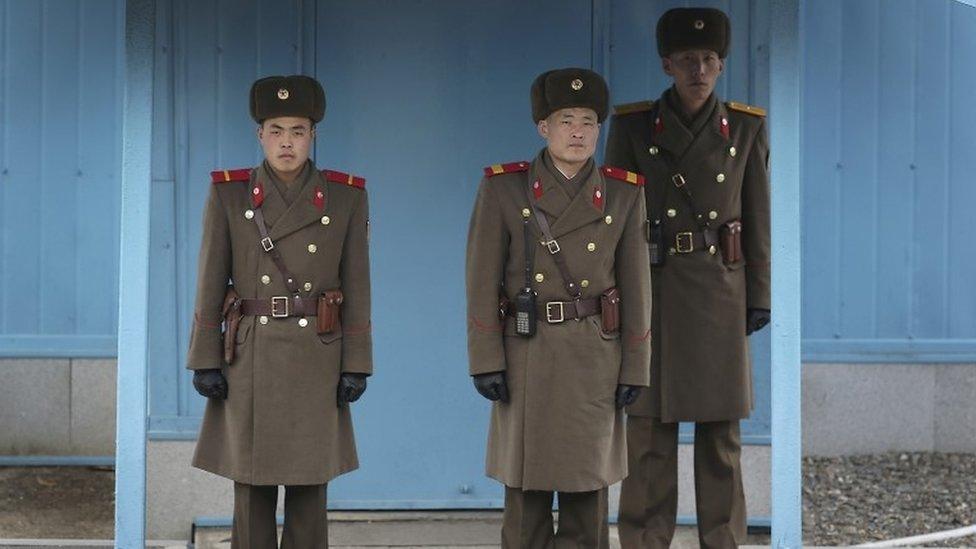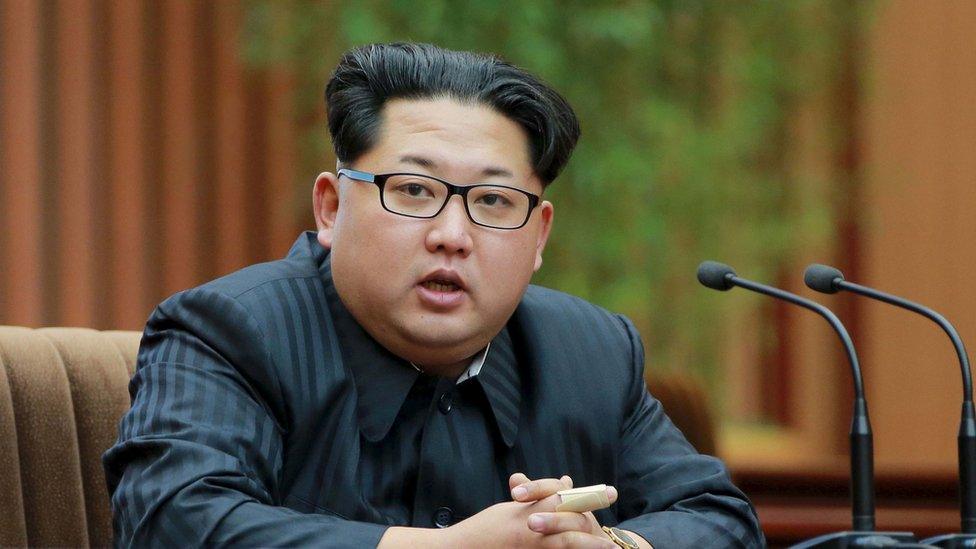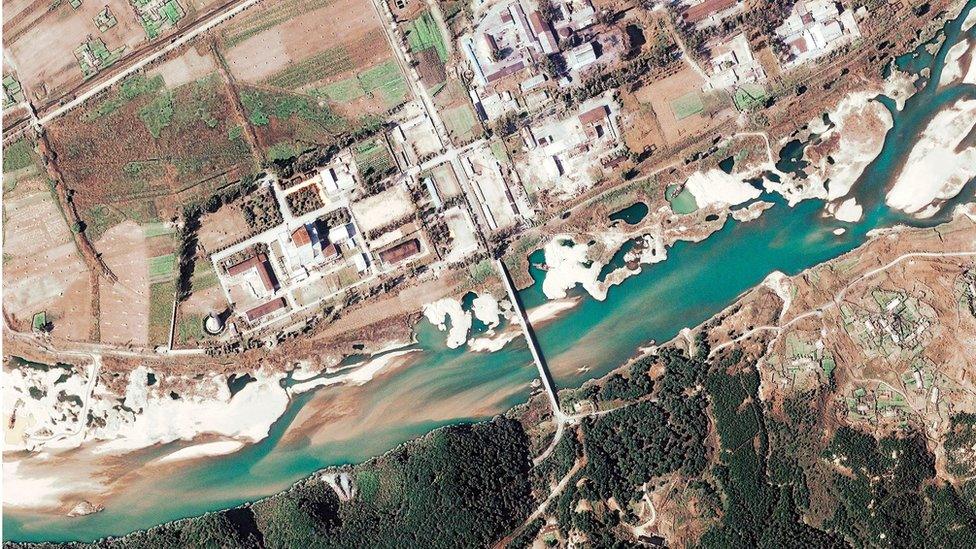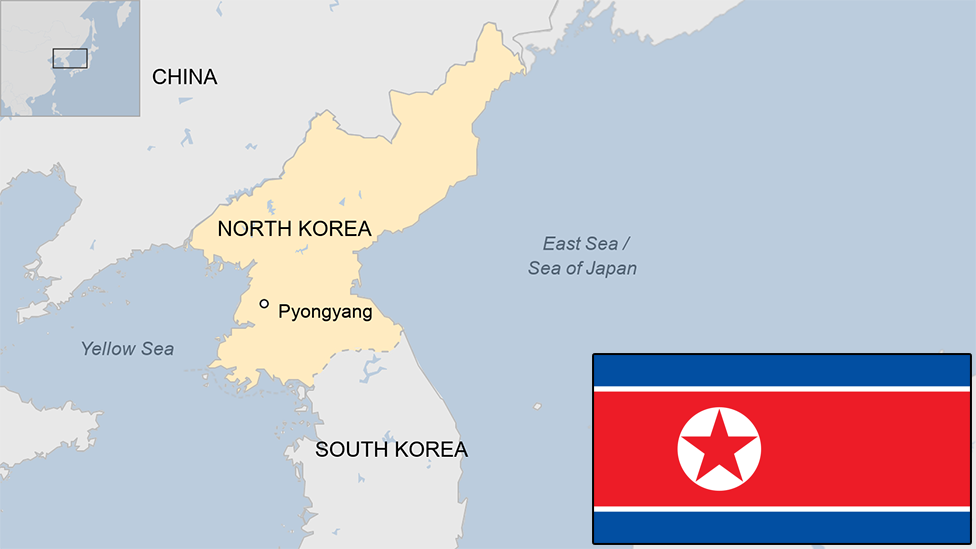North Korea 'fires missiles' into sea hours after UN vote
- Published
Steve Evans reports on how sanctions might affect North Korea
North Korea has fired six short-range projectiles into the sea, South Korea's defence ministry has said, hours after the UN imposed tough new sanctions.
A South Korean spokesman told the Yonhap news agency the projectiles were fired at about 10:00 local time (01:00 GMT) from Wonsan on the east coast.
They were either rockets or guided missiles, the ministry said.
Correspondents say it is being seen as an act of defiance against the sanctions.
Hours earlier, the UN Security Council unanimously voted to impose some of its strongest ever sanctions against North Korea. The new measures are in reaction to North Korea's recent nuclear test and satellite launch, both of which violated existing sanctions.
They will result in all cargo going to and from the country being inspected, while 16 new individuals and 12 organisations have been blacklisted.

Find out more
Is it better to deal with Kim Jong-un using carrots or sticks?
North Korea is believed to have more than 1,000 missiles of varying capabilities. Here is a look at the country's arsenal.
All shipments of goods to North Korea must be inspected under new sanctions. Chinese city Dandong handles much of North Korea's trade.

The United States and North Korea's long-standing ally China spent seven weeks discussing the new sanctions.
US President Barack Obama said the international community was "speaking with one voice" to tell the North it "must abandon these dangerous programmes and choose a better path for its people".
However the BBC has found evidence that raises questions about how ready China is to enforce the sanctions, as coal barges continue to arrive across the border.
South Korea's President Park Geun-hye welcomed the sanctions, saying she hoped the North "will now abandon its nuclear development programme and embark on a path of change".
John Sudworth reports from Dandong in China on the continuing trade between North Korea and China

North Korea sanctions explained

The UN Security Council unanimously approved the measures
What exactly is banned?
The export of coal, iron and iron ore used for North Korea's nuclear or ballistic missile programmes.
All gold, titanium ore, vanadium ore, rare earth minerals and aviation fuel exports.
Any item (except food and medicine) that could develop North Korea's armed forces.
Small arms and light weapons are now included in an arms embargo.
Upmarket watches, watercraft, snowmobiles and other recreational sports equipment added to a ban on luxury goods.
No vessels or planes can be leased or registered to North Korea.
What are the other measures?
Member states must inspect all cargo to and from North Korea, not just those suspected of containing prohibited items.
An asset freeze on North Korean funds linked to nuclear and missile programmes.
Foreign financial institutions cannot open new offices in North Korea without approval, and North Korean banks cannot open offices abroad.

North Korea insists its missile programme is purely scientific in nature, but the US, South Korea and even its ally China say such launches like the one which put a satellite in orbit last month are aimed at developing inter-continental ballistic missiles.
The North claimed its January nuclear test - the fourth since 2006 - was a test of its hydrogen bomb technology.

Analysis: Steve Evans, BBC News, Seoul

North Korea says it is entitled to conduct ballistic missile research
The firing of the missiles is being seen in South Korea as a signal of the North's anger and defiance. There is an expectation in South Korea that more may follow. The short-range missiles were not contrary to international law though longer range missiles would have been.
There is a ritual which has been enacted many times before with a ratcheting up of tension. In this case, the nuclear test and rocket launch earlier in the year were followed by South Korea closing a joint industrial venture and the UN sanctions.
Next week, there are previously arranged and regular joint exercises between South Korean and US troops. Each year when they happen, North Korea gets very angry, saying they are practice for an invasion. This year the tension will be even higher.
The rhetoric from Pyongyang has been fearsome. The state media likened the South Korean president to a bat who lives in a dingy cave. They said she would "lift her skirt" for the Americans.
All this is par for the course. The big question is whether North Korea holds a fifth nuclear test.
Outside observers who study satellite imagery say that it's very hard to tell when this might happen. The fourth test came out of the blue. North Korea has succeeded in hiding the tell-tale signs of preparation and may do some work under cloud cover away from the prying eyes of satellites.

China media reaction: Kerry Allen, BBC Monitoring
People's Daily and Global Times have in the past stressed that no good can come from imposing sanctions on North Korea, arguing that measures such as oil embargos "will result in social chaos within North Korea".
In January, leftist daily Ta Kung Pao said that sanctions were "no different from forcing North Korea's economy to collapse". It emphasised that any sanctions should be focused on curtailing North Korea's nuclear ambitions.
But in response to increased discontent from the public over China's relationship with North Korea, Global Times said on 26 February that "China has done all it can" and that "severe" sanctions had now become "inevitable".
It said that "an increasing number of Chinese people "no longer consider North Korea as friendly".
Users of popular microblog Sina Weibo have made continued derogatory references to North Korea. The prevailing sentiment seemed to be that China had been foolish to continue to stand by Pyongyang.

- Published24 February 2016

- Published10 August 2017
- Published10 August 2017

- Published19 July 2023
